

Share
22nd September 2016
09:32pm BST

Whitehead was once the drummer in Marmalade and he was a friend of Robert Winsor, a financier and stalwart of the celebrity golf circuit in the 1970s and 1980s.
Winsor would frequently throw parties on a Saturday night at his north London home and the guests could often include those who had appeared on London Weekend’s The Des O’Connor Show earlier that evening.
At one of those parties, Whitehead played pool with Sammy Davis Jr and he met many of those who dominated the light entertainment world in the 1970s in Winsor’s house. On a night in 1978, he formed an enduring friendship with David Dein when Dein couldn’t move his car because a Rolls belonging to someone at Winsor’s party had sunk into the lawn where it had parked and was blocking his way out.
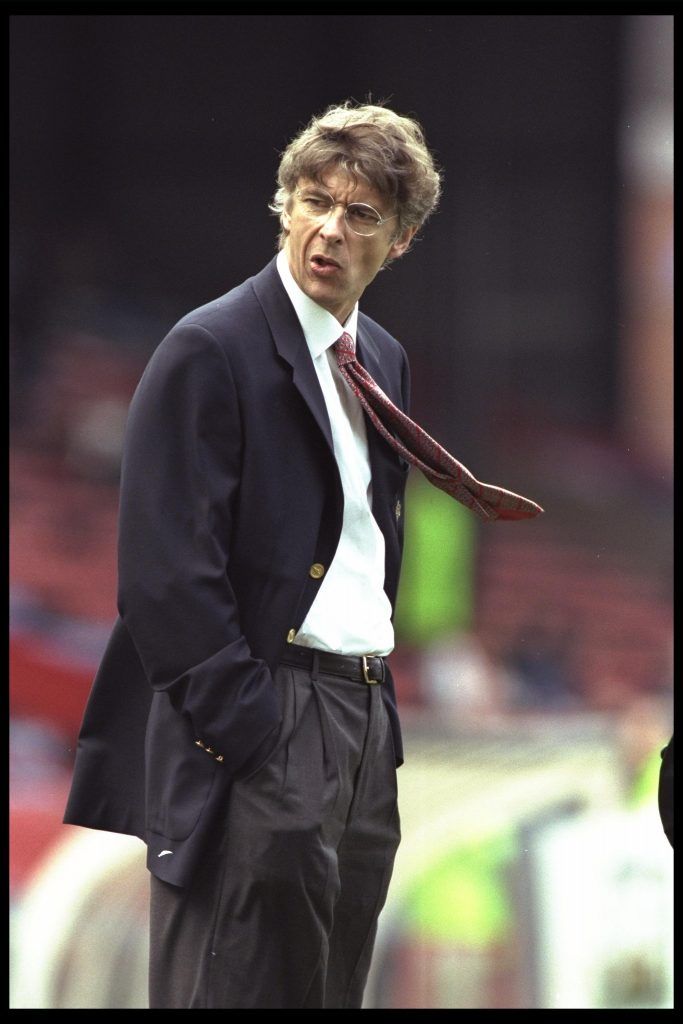
Whitehead drove a Morris 1100 and he still laughs when he thinks of how his little motor was able to drive out of the sunken grass while the statement cars remained marooned in the grass.
Whitehead and his Morris 1100 provided a lift for Dein and his wife Barbara and a friendship began. Dein had a generosity of spirit which ensured he made friends from many walks of life. Dein has explained his approach as the motto of the turtle, “You never get anywhere in life unless you stick your neck out.”
Eleven years later, in January 1989, Dein, by then vice-chairman at Arsenal, and Barbara were looking forward to a dinner party at Whitehead’s house on a Saturday night.
Dein was in the boardroom at Highbury on that January day when he was told that the manager of Monaco was in the lounge outside speaking to Barbara. Dein went out to talk to Arsene Wenger and, employing the motto of the turtle, asked him if he would like to accompany Dein and his wife to dinner in a friend’s house that night.
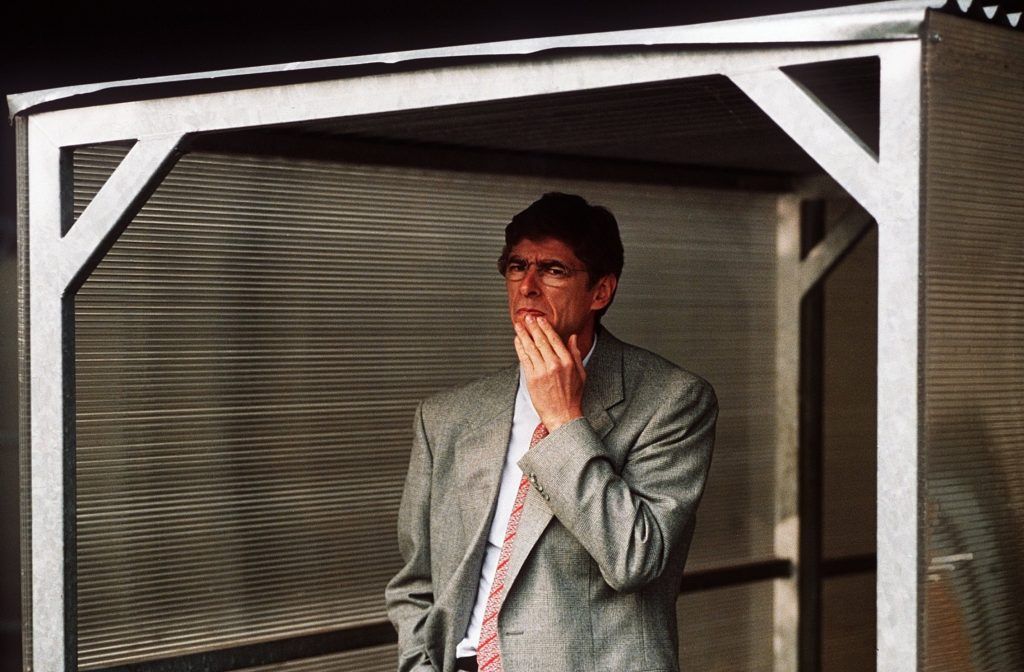
So that was how Alan Whitehead ended up opening the door to David, Barbara and an unassuming Frenchman, whose presence he can barely recall, on a January evening in 1989.
Dein has recounted that they played charades and Wenger ended up miming A Midsummer Night’s Dream.
“That sounds about right,” Whitehead says, before adding with a smile, “I’m glad I played a small part in Arsenal’s history.”
Dein has, understandably, always looked back fondly on that initial encounter. “I was convinced Arsene would become our manager from the first day I met him,” he said in 2014. “He was not only charming and highly intelligent, but clearly able to adapt as well.”
In January 1989, Arsenal were top of the old first division, five months away from a first league title in eighteen years and had no need of a new manager.
George Graham was an authoritarian or, more precisely, he had tremendous authority over his players on the field. What they did in their own lives would suggest that no man can truly control another.
Graham - inspired by how old Liverpool back fours had moved as one - famously tied the defence together with rope to drill them and make them disciplined. It worked. Arsenal would win another league title in 1991 and Graham had a team he could rely on. He had team of attritional purpose structured around that defence which ensured that one-nil to the Arsenal became not just a result, but a slogan, a part of popular culture.

“Let’s get the three points and get out of this country town.” Graham would tell his players before they walked out at Carrow Road or Filbert Street and he was confident they would obey. Arsenal under Graham had a metropolitan arrogance mixed with steel.
In 1995, Graham was sacked, not because results had been disappointing - Arsenal had won eight trophies in six seasons, even if they were tenth in the league on the day Graham was dismissed - but because a Premier League inquiry established that Graham had received bungs totalling more than £400,000 as part of the transfers of John Jensen and Pal Lydersen to Highbury.
Steve Coppell was considered one of the favourites to succeed him, but Dein had another man in mind. At the beginning of the 1994/95 season, Wenger had been dismissed by Monaco after a poor start to the season. That December, he agreed to become manager of Grampus Eight, but when Graham left, Dein wanted the man he had believed would manage Arsenal ever since he first met him in January, 1989.
Stewart Houston became caretaker when Graham was sacked and there was a lot to take care of.
A month before Graham had been dismissed, he sat beside Paul Merson as the player explained that he was addicted to alcohol, cocaine and gambling.
In 1991, club captain Tony Adams had spent two months in jail after he crashed his car into a wall when he was four times over the drink-drive limit.
Graham had created a disciplined side, but he and Arsenal were discovering there were limits to that discipline.
While Dein pushed for Wenger, others in the boardroom weren’t so sure. Was Wenger - a foreigner - what this collection of players needed at the time?
"I liked him immediately. I was just nervous, and I think some of my colleagues were as well,” the then chairman Peter Hill-Wood recalled in 2014. “Whether we were ready for a French coach. We had a fairly difficult team. Some of the behaviour wasn't very good. There were a few problems with Tony Adams and Paul Merson and one or two of the others.
"It proved to be wrong, but the experience that clubs in the UK had prior to that was not very good really with foreign people. So we decided not to appoint him.”
Instead, Arsenal would attempt to return to the age of the disciplinarian. Bruce Rioch, the son of an Army man, was appointed after an impressive couple of years with Bolton Wanderers.
“We had a bit of a disaster with Bruce Rioch, who wasn't up to the job really,” was how Hill-Wood recalled it.
In the final years of George Graham, Arsenal had depended on the goals of Ian Wright to win matches while their experienced - some said ageing - back four kept clean sheets.
Rioch would do things differently. Dennis Bergkamp and David Platt arrived and there would be a new style. Yet the change brought too much disruption.

“I don’t think he really had the core of the team on his side,” says Andy Linighan, scorer of the winning goal for Arsenal in the 1993 FA Cup final replay. “He had a bust up with Wrighty which didn’t go down too well in the camp. He tried to bring his team ethic which had been successful at Bolton but I don’t think they really fitted.”
Rioch and Wright didn't get on, with Wright said to be put out because, among other things, Rioch once suggested he could learn something from John McGinlay, the centre forward he worked with at Bolton.
Wright, who ultimately would score 185 goals for the club, had an uneasy relationship with Rioch and, before the end of that season, ended up handing in a transfer request.
Rioch’s Arsenal finished fifth in the league, but the revolution had not taken place, at least not as Arsenal had imagined it. “The players listened to him and they were professional but I think we were ingrained into a certain way at that time and he found it difficult to change," Linighan says.
After the experience with Graham, Arsenal had been reluctant to allow a manager free rein with transfers so the squad wasn’t overhauled as Rioch would have hoped.
Arsenal had qualified for Europe so there was that to look forward to the following season.
That summer, England hosted the European Championships and their side - with Adams centrally involved - reached the semi-final before losing to Germany on penalties.
The mood across the nation was hopeful. Football clubs were expanding their horizons and anything seemed possible. Embracing that spirit of hopefulness, five days before their first game of the 1996/97 season, Arsenal sacked Bruce Rioch.

“There were things going on that we didn’t know about,” Linighan says, so the surprise many felt at the decision wasn’t shared within the dressing room. “I don’t think it was much of a shock.”
Within the dressing room, other things were changing. Following England’s defeat to Germany, Adams had, as so often before, retreated to drink. For the next seven weeks, he would attempt to find comfort in the old consolations, but the old consolations no longer worked. The day before Arsenal’s first game of the season, Tony Adams decided he could no longer keep making the same mistakes.
With Houston as caretaker again, Arsenal won their opening game of the season. The following Monday Adams went to training and bumped into Steve Jacobs, a friend of Merson’s who had been helping him with his addictions. “I’ve got a drink problem and I need to go to a meeting of Alcoholics Anonymous,” Adams recalled telling Jacobs.
By then, Wenger’s name was already been put forward as a possible manager, but Johan Cruyff was considered the popular choice.
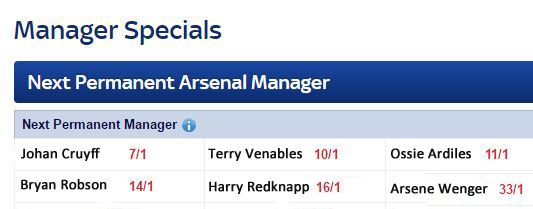
“We were just waiting to see who was going to be named,” Nigel Winterburn says, “and when Arsene Wenger’s name came forward, the players were the same as most people and saying, ‘Arsene Who?'"
Linighan has similar recollections. “I’d never heard of him personally, and I don’t think a lot of the team had unless there was somebody who was a fan of Monaco.”
The story goes that the Evening Standard ran the headline 'Arsene Who?', although no record of it exists and some say it was just a billboard outside a tube station.
“It was just a case of waiting and finding out as much as possible about the new manager,” Winterburn says. “Like most players, once a manager comes in your next thought turns to whether you’re going to be part of his plans.”
Others wondered if this was what was required in English football. “Does British sport need foreign coaches?” one writer asked on the first weekend of the season. “Did we make a hash of things in Atlanta because we didn't have more of the likes of Jürgen Gröbler, the German rowing coach who megaphoned Redgrave and Pinsent to victory, or was this only part of the problem? Football's experience presents a contrary proposition – that foreign coaches are the problem. Those few who have tried to transform the manly virtues of our national game into something more aesthetic have tended to disappear up their own intricacies while their teams have disappeared down the table.”
As Cruyff and others were ruled out, Wenger appeared to be the only remaining candidate. Yet he was still managing in Japan until their season broke in October.
In early September, Peter Hill-Wood talked to the media after the Arsenal AGM and insisted that everything was under control but, out of respect, they couldn’t reveal the identity of the new manager at this time.
When he was asked to whom he had made this promise of secrecy, he replied, “To Arsene Wenger and his club.”
Houston continued as caretaker, but the absence of a manager created a sense of crisis around the club.

Two days after Arsenal had lost at home to Borussia Monchengladbach in the Uefa Cup, Houston resigned as caretaker.
In his autobiography, Adams recalls receiving a call from Old Etonian Hill-Wood as he drove through West London. “I hear the shit’s hit the fan,” the chairman said, calling from New York. “Don’t worry, we’ve got a good guy coming. Rally the troops. See you soon.”
Of course, some still wondered how Wenger would be received in an old school dressing room, but it was a dressing room that was learning through the life experiences of Merson and Adams, that there was another way.
The day after Houston left, Adams told his team-mates at the club’s training ground that he had a drink problem and was attending AA. Linighan said to him, “You’ve cracked it Tony, you’ve taken the first step.”
The following day, the story appeared in the Daily Express and Adams told the press in the car park of the training ground. “As I drove away,” he wrote in his autobiography, “the man from the News of the World was shouting figures at me as payment for my story, the sums seeming to go up as the window wound up. 'This is for me,' I told him, 'not for money'.”
Arsenal didn’t have a game until the following Monday, but there were clues that the new manager might be about to embark on radical change.
Two days after Rioch was sacked and a day after Cruyff had ruled himself out, Arsenal announced the signing of two French players, Patrick Vieira and Remi Garde.
“His debut was pretty impressive,” Winterburn says and for all of those who watched Vieira’s initial displays for Arsenal before Wenger had arrived there was a sense that the new manager had, at the very least, an eye for a player.

Vieira's debut came on Monday, September 16th, 1996. Earlier in the day, Arsenal confirmed that Wenger was their new manager. That evening, Wenger appeared on the video screen at Highbury offering a message of reassurance, but what followed from Vieira provided a greater sense of calm.
“You could tell he was a good all-round player, even though he was a young lad,” Linighan said. “He made an immediate impression, he was a natural and became a big influence early on, even though he was only young.”
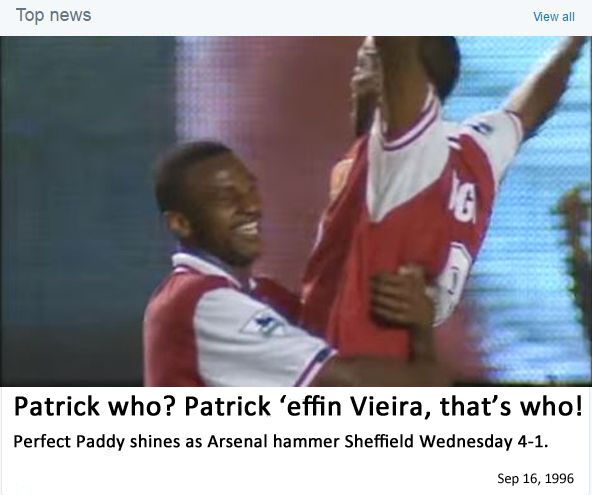
The following weekend, Wenger arrived to meet the press and, more importantly, the players. He confirmed that Pat Rice would be his number two.
The “off the field” issues which hung around the club were seen as the problem Wenger would have to deal with and were raised with him on that first day.
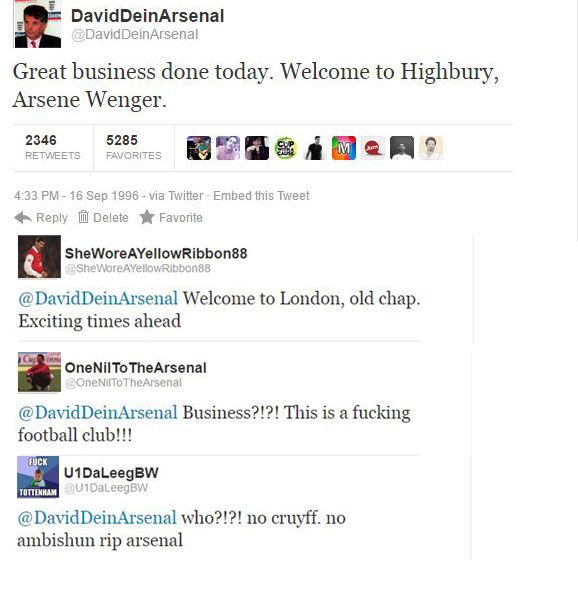
Arsenal had the second leg of their tie against Borussia Monchengladbach three days later and Wenger’s first contribution - he went in at half time when the scores were level on the night and switched from the back three used under Rioch to a back four - was seen by some as unhelpful as Arsenal eventually lost 3-2.
“A lot of my old angry thinking was resurfacing,” Adams wrote. “What does this Frenchman know about football? He wears glasses and looks more like a schoolteacher.”
But there was another side to Adams now and that was the side that which be drawn out by Wenger, that would recognise how much was possible in the new world.
Adams’ recovery wouldn’t have been altered by the identity of his club manager, but in Wenger he found a person who would willing help him step into the brave and challenging new world.

“I think there was a spiritual element to it at the time, both men were right for each other,” says Ian Ridley, the journalist who worked with Adams on his stunning autobiography Addicted.
"Tony was just getting sober and he had a manager who was tolerant and liberal and understanding of his situation. Wenger, in turn, had this English yeoman who was going to educate him in the ways of the Premier League."
Wenger's parents had run a bar and bistro in Strasbourg, an environment which he has said told him everything he needed to know about human psychology. It certainly would have told him all he needed to know about drink.
“A new and different me was emerging was beginning to emerge as a result of not drinking,” Adams wrote. “Another part of me, the rational part, was saying, ‘Give him time, let’s have a look at him’.”
When Wenger took over officially, the changes were immediate, but he also realised what should change and what shouldn’t.
“One of the clever things he did was to do nothing,” Ridley says. Wenger would retain the defence - Adams persuaded him to stick with a back three for the rest of the season - but how they prepared would change.
Those alterations would prolong the careers of players like Winterburn and Lee Dixon, but Winterburn says that was never the main consideration.
“I don’t think you ever worried about extending your career,” he says. "I’d talk more about his training methods. You couldn’t but be impressed. At that time in my career, it really suited me down to the ground.”
Wenger told them what would change. Their meals would be radically altered. Broccoli and steamed fish would be the diet, influenced by Wenger’s time in Japan, chocolate before matches would be banned and sugar in general would be frowned upon. And, most critically, the age of the Tuesday Club, the drinking crew that was part of the George Graham era, was at an end.
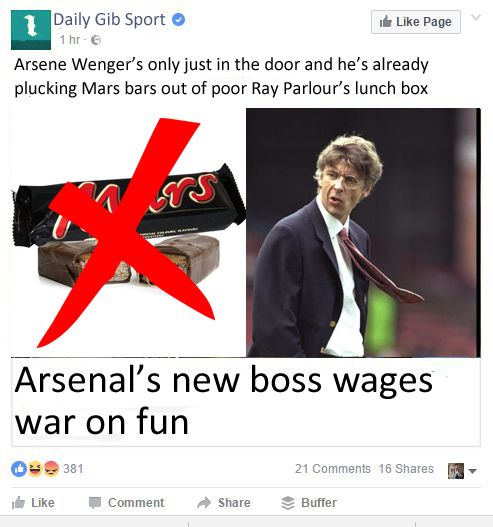
The 20th anniversary of Wenger’s arrival could be marked at several points - the day Arsenal announced he was taking over, the day of his first press conference when he was technically not taking charge for another eight days. His first game when he went into the dressing room at Borussia Monchengladbach, October 1st when he officially took up the role or his first match in charge on October 12th away at Blackburn.
That day began with Wenger calling the players into a ballroom at the team hotel and leading them in a series of stretches.

“We were always looking at each other and having a little snigger and thinking ‘What’s going on here?’,” Linighan says.
Linighan recalls the talk of slow-release and quick-release food. “There was a lot of broccoli,” he laughs.
At half-time in the Blackburn game that day, Wenger asked the physio Gary Lewin why the players were so quiet. “They’re hungry,” Lewin said and pointed out they wanted their Mars bars.
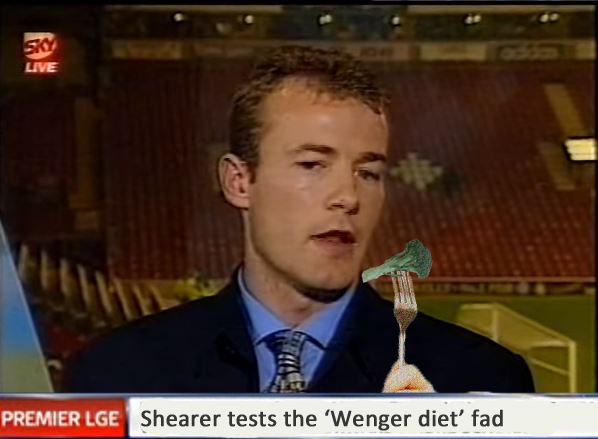
Arsenal won the game 2-0 and the following season, inspired by Adams, the symbol of old England who now spectacularly embodied the idea that everyone was capable of change, Arsenal won the double.
“Reality is good,” Adams said at the time, speaking about the life he had embarked on but that sense of possibility seemed to be reflected in the team he captained.
On the way to Ewood Park for Wenger’s first game, the players began to chant,“We want our Mars bars back.” Wenger smiled as they jokingly made their point. But there would be no turning back. Wenger and Arsenal were embarking on radical change and, for a time, the future would seem to belong to them.
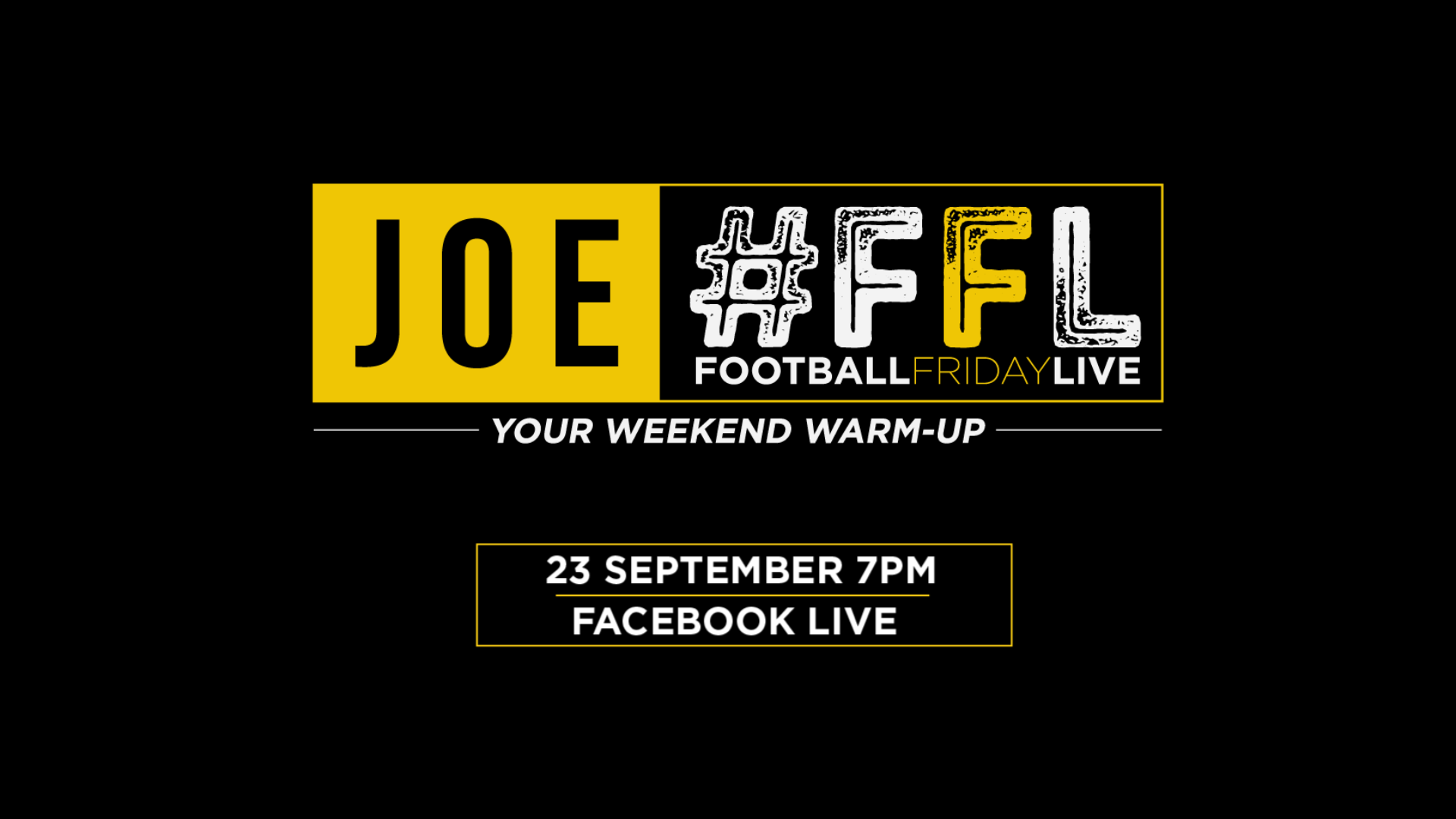
Explore more on these topics: